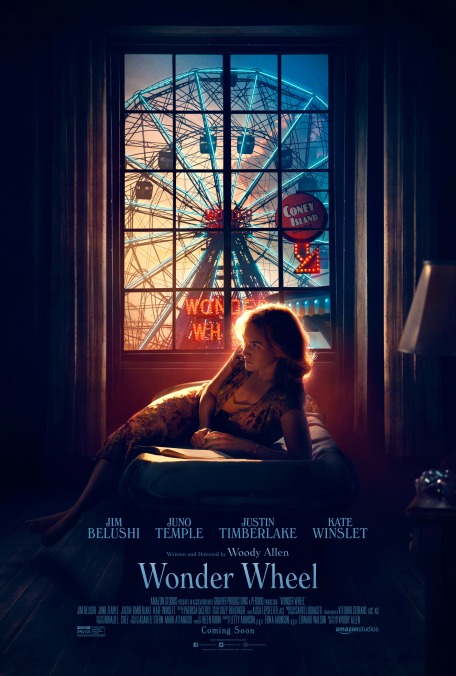Wonder Wheel is one of Woody Allen's sourest, stagiest, and most disturbingly personal movies

What the hell is anyone to make of Woody Allen’s Wonder Wheel, in which a self-proclaimed romantic entertains leaving his lover for her much younger stepdaughter? Separating the man from the art is always difficult when it comes to the legendary New York neurotic of American moviemaking, whose personal life remains an enduring source of controversy and scrutiny, both for the sexual abuse allegation that’s hung over it since the early ’90s and for the fact that, yes, he married his ex-girlfriend’s adopted daughter. But Allen, who still operates at the clockwork clip of one or two movies a year, doesn’t make it any easier to approach his work on its own terms; he possesses what may be a pathological need to throw a spotlight over his own experiences, relationships, and hangups. Even by those standards, Wonder Wheel is uncomfortably revealing, its real-life parallels too blatant to be anything but intentional. But to what end?
The harsh truth is that confessional elements tend to be the default source of fascination, however perverse, in Allen’s later work—a.k.a. just about anything he’s made this millennium, supposed “comebacks” included. Remove the consciously or unconsciously personal angle, and Wonder Wheel is just another case of Allen repeating himself, tackling themes, plot points, and philosophical ideas he’s better handled elsewhere. It’s another of his downward-spiral tragedies about a woman on the verge of a nervous breakdown. The woman this time is Ginny (Kate Winslet), a former actress teetering on the edge of middle age, waiting tables in the Coney Island of the 1950s. Ginny, who cheated on and then lost her first husband years earlier, is stuck in a loveless marriage to oafish ride operator Humpty (a bellowing Jim Belushi) and saddled with a disobedient, pyromaniac son (Jack Gore). If there’s a glimmer of hope in her life, it’s the affair she’s having with handsome, pie-eyed lifeguard Mickey (Justin Timberlake).
Woody has hopped this Streetcar before, most recently with Blue Jasmine, featuring Cate Blanchett doing her best Blanche DuBois. But Wonder Wheel is more clumsily theatrical, more way-Off-Broadway, in its Tennessee Williams homage. When Humpty’s long-estranged daughter Carolina (Juno Temple) reemerges, fleeing the mobster he disowned her for marrying, the tense reunion plays out across the stage-like space of Humpty and Ginny’s apartment—the actors entering right and exiting left, spewing fussily engineered dialogue (“There’s a world out there!”), the beaches and boardwalks shining brightly in the windows behind them like a painted backdrop. Some of this vaguely resembles the dramas of Eugene O’Neill, and in case anyone misses that, Allen gracelessly underlines it by having the characters at one point actually discuss Eugene O’Neill.
Wonder Wheel announces its artificiality immediately, allowing Mickey—an aspiring wordsmith who wants to write “Great, tragic plays where the protagonist gets crushed by some fatal weakness”—to frame the story through tonally incongruous, fourth-wall-breaking narration. Allen, blessedly, hasn’t tried to coax a Woody impression out of Justin Timberlake, but Mickey still looks like one of the writer-director’s familiar, even stock surrogates: the idealistic, overthinking dreamer. Mickey’s romantic attention eventually, perhaps inevitably drifts to the naive Carolina, and his self-justifications—the excuses he makes for his own fickle affections—might scan as some kind of auto-critique if Allen didn’t let him off the hook by the dispiriting climax. (His lofty seat on the beach becomes not just a metaphor for the full view of the storyteller, but also a symbol for moral high ground.)
There’s a certain sadism to Wonder Wheel’s dramatic architecture, one that again should look familiar to anyone who’s seen Allen tell this kind of story before. Winslet makes Ginny’s desperation and yearning and gnawing unhappiness palpable—if Wonder Wheel breaks any hearts, it will be because of her naked commitment. But the star is defeated by the demands of the character: As Ginny loses her grip on love and sanity, she becomes one of Allen’s signature scorned shrews, lashing out shrilly at everyone in her proximity; were Woody riffing on Dostoevsky, as he so often does, Mickey would eventually come to the conclusion that he has to kill her. Even the film’s pleasures carry a kind of cruelty, with Ginny’s misery ironically clashing with the sun-dappled fantasyland of Coney Island, luminously filmed by Italian cinematographer Vittorio Storaro, who brought uncommon luster to Allen’s last movie, Café Society. And Woody’s common practice of putting a song on loop gets perhaps its most bitter workout ever with the almost mocking repetition of The Mill Brothers’ cheery barbershop staple “Coney Island Washboard.”
Whether tragedy is fated or self-inflicted is a question that Wonder Wheel keeps raising but never answers. It seems much more interested in providing rationalizations for its narrating lothario, who knows what he shouldn’t do but does it anyway, because following your truest desires makes a certain logical, maybe even moral sense. (“The heart has its own hieroglyphics,” he concludes.) Charitably, one could argue that by framing the whole story as the poetic musings of a pretentious budding dramatist, Allen is telling the audience not to trust its conclusions or even its attitudes toward the characters. But by the end, which can be spotted a mile away even if you’re not perched on a lifeguard seat, Wonder Wheel has become the story of a pitiable woman who makes a vindictive, destructive decision because she’s been emotionally hurt. Given the unmistakable echoes of Allen’s own history, that gives this clunky dinner-theatre drama an especially sour aftertaste.